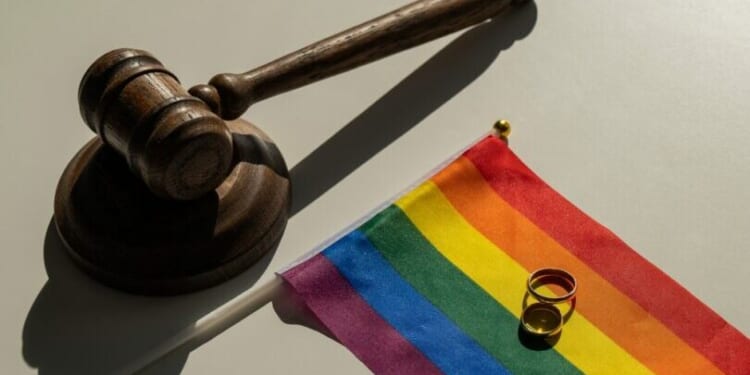(LifeSiteNews) – The share of Americans who support same-sex “marriage” has fallen to 54%, according to a new poll, suggesting a backlash to the LGBT extremes of the past decade could be making its way to one of the source issues.
The October 24-27 Economist/YouGov poll asks about a wide range of current issues, including same-sex “marriage.” Fifty-four percent said it should be “legal,” 33% said “illegal” and 13% are unsure.
While still a clear majority supports same-sex “marriage,” the findings are strikingly lower than tracked by polling outfits such as Gallup, which has not found support for same-sex marriage below 60% since 2015, the year the U.S. Supreme Court’s Obergefell v. Hodges ruling forced all 50 states to recognize homosexual unions as marriages. (In May, Gallup found support still higher at 68%.)
Notably, the YouGov framing of the issue around “legal/illegal” could be construed as implying some sort of punishment, while Gallup’s questioning more accurately asks whether same-sex unions should be “recognized by the law as valid, with the same rights as traditional marriages.” Yet the harsher-sounding question garnered less support for same-sex “marriage” than the milder one.
Nevertheless, the findings set off hope among social conservatives and fear among LGBT supporters of an impending cultural shift. After being so politically toxic that not even far-left Democrat President Barack Obama was willing to endorse it until halfway through his presidency in 2012, same-sex “marriage” won cultural acceptance when Republicans largely stopped fighting the argument that it was purely a matter of personal liberty and would not affect religious families.
That quickly proved not to be the case, as numerous photographers, bakers, event venues, and similar businesses were met with attempts to force them to serve same-sex weddings. Opposition to such assaults did not appear to impact support for gay marriage itself, but LGBT activists eventually moved on from homosexuality to transgenderism as their top priority, unleashing an array of controversies such as subjecting confused children to life-altering surgeries, letting men usurp female accomplishments in athletic competitions, and forcing girls to share vulnerable private spaces such as lockers and restrooms with males.
None of these causes ever won the same kind of widespread mainstream sympathy as so-called “marriage equality,” and in fact the Democrat Party’s catering to the latest LGBT extremes has been recognized in some quarters as a political liability. Conservatives argue the root cause of all these issues is the dismantling of objective sex distinctions that began with the redefinition of marriage.
However, a true sea change still has a long way to go. Thirty-two states still have duly-enacted same-sex “marriage” bans on the books, according to World Population Review (which lists 33, but as of this writing still has not been updated to reflect Colorado’s April repeal of its unenforced ban), all of which have been blocked from enforcement since Obergefell. Only 18 states plus the District of Columbia have no ban in place.
As a practical matter, even if the Supreme Court reversed Obergefell, recognition of same-sex “marriage” would still be mandatory nationwide, thanks to former President Joe Biden signing the so-called Respect for Marriage Act, which codified Obergefell, in 2023.
Three of the current sitting justices — Chief Justice John Roberts and conservatives Justices Clarence Thomas and Samuel Alito — dissented from Obergefell. The latter two are considered reliable votes to overturn if the chance arises, given statements both have made in the years since. But it is less certain how Roberts and the Court’s three more recent Republican appointees would rule, given past statements about deferring to precedent and their mixed records on cases important to conservatives.
Meanwhile, at least half a dozen states have adopted resolutions urging the nation’s highest court to revere Obergefell. They have no legal force or can they begin any legal battle that could eventually put the issue back before the nation’s highest court, but they raise awareness of an issue that, while long since declared “settled” by the establishments of both parties, set the stage for today’s battles over transgenderism, surrogacy, and religious freedom.
Social conservatives are likely to have an uphill battle on the issue for the foreseeable future. In July 2024, the Republican Party adopted a dramatically shortened national platform with various changes sought by returned President Donald Trump, who supports same-sex “marriage” and whose “MAGA” movement is to the left of traditional conservatism on homosexuality.
Among those platform changes was removing language declaring that “Traditional marriage and family, based on marriage between one man and one woman, is the foundation for a free society,” and language that called for that understanding to be reflected in law, including with the “reversal” of Obergefell.
















